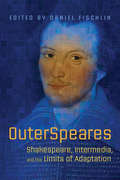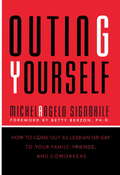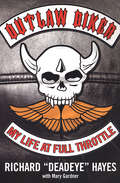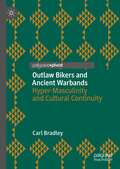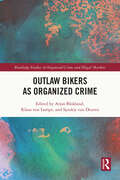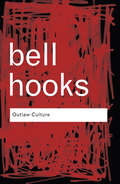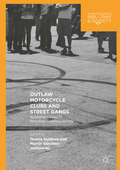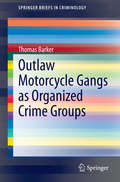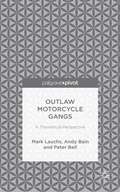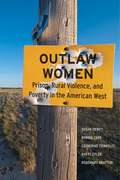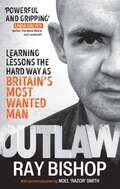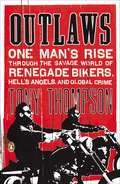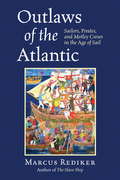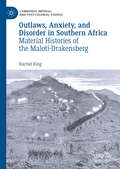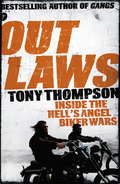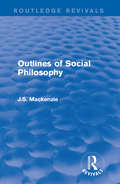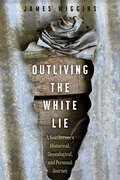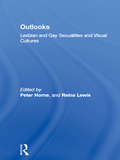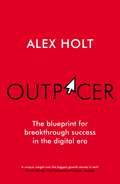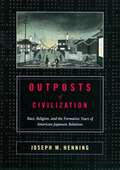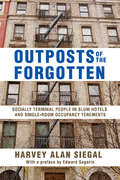- Table View
- List View
OuterSpeares
by Daniel FischlinFor Shakespeare and Shakespearean adaptation, the global digital media environment is a "brave new world" of opportunity and revolution. In OuterSpeares: Shakespeare, Intermedia, and the Limits of Adaptation, noted scholars of Shakespeare and new media consider the ways in which various media affect how we understand Shakespeare and his works.Daniel Fischlin and his collaborators explore a wide selection of adaptations that occupy the space between and across traditional genres - what artist Dick Higgins calls "intermedia" - ranging from adaptations that use social networking, cloud computing, and mobile devices to the many handicrafts branded and sold in connection with the Bard.With essays on YouTube and iTunes, as well as radio, television, and film, OuterSpeares is the first book to examine the full spectrum of past and present adaptations, and one that offers a unique perspective on the transcultural and transdisciplinary aspects of Shakespeare in the contemporary world.
Outing Yourself: How to Come Out to Your Family, Your Friends, and Your Coworkers
by Michelangelo SignorileFrom the author of Queer in America comes a complete, step-by-step guide to coming out of the closet--the first coming-out guide to the '90s. Signorile's pull-no-punches style gives this book a Susan Powter-ish Stop the Insanity! approach to a difficult and often mishandled experience.
Outlaw Biker: My Life at Full Throttle
by Mary Gardner Richard "Deadeye" HayesIn this no-holds-barred memoir, a legendary biker recounts his life of sex, drugs, rock & roll and lots of broken laws.Here is the true-life story of Richard &“Deadeye&” Hayes in all its bad-ass, balls-to-the-wall glory. This is a man who stole a machine gun before he was seven and lost his left eye when a good friend shot him in the face. As a member—and then president—of the infamous Los Valientes Motorcycle Club, he broke more laws and had more fun than any six of the coolest guys you know.One of the last true Outlaw Bikers, Deadeye knows what it means to be a man, take shit from no one, and have tattoos that actually say something. Riding, drug dealing, and sending men to the hospital with his bare hands, Deadeye made himself a legend among bikers—all the while making sure his daughters never got mixed up with guys like him.&“This may just be the best book ever written by an author who's been shot twice, stabbed once, and bitten by a rattlesnake!&” —Geoffrey Leavenworth, author of Isle of Misfortune
Outlaw Bikers and Ancient Warbands: Hyper-Masculinity and Cultural Continuity
by Carl BradleyThis book is the first to compare the shared cultural tenets of ancient warbands and outlaw biker gangs. It argues that the values of hyper-masculinity can be traced from the former into the contemporary environment of the latter: codes of honour, loyalty and bravery have prioritised small groups of males over women and other men, creating a history of hyper-masculinity that shows little sign of stopping. Indeed, Outlaw Bikers and Ancient Warbands: Hyper-Masculinity and Cultural Continuity argues that such hyper-masculine culture can be found in many male groups such as the police, military and sports, and that if we want to understand hyper-masculinity and face it as a society then we need to recognize that outlaw bikers are a reflection of behavior that has a very long tradition. This pioneering work explores these issues from ancient times and into the future.
Outlaw Bikers as Organized Crime (Routledge Studies in Organised Crime)
by Arjan Blokland Klaus Von Lampe Sjoukje Van DeurenThe title of this volume Outlaw Bikers as Organized Crime reluctantly combines two highly contested concepts into a statement that is perhaps disputed even more. Who and what do we refer to when we talk about ‘outlaw bikers’ and ‘outlaw biker clubs’? What is meant by ‘organized crime’? And, how – if at all – are these two concepts related? All the chapters in this volume deal with these questions some way or the other, either explicitly or implicitly, each providing its own answers based on the data and methods at hand.This volume presents cutting-edge research on outlaw bikers and outlaw biker clubs from countries all over the globe and reflects the different ways that academic researchers have approached the outlaw biker phenomenon from the theoretical and methodological vantage point of organized crime research.
Outlaw Culture: Resisting Representations
by Bell HooksIn this collection of essays, noted feminist thinker Bell Hooks critically analyzes a number of popular cultural practices and icons. Topics include the paintings of artist Jean-Michel Basquiat, the polemics of author Katie Roiphe, and the politics of rapper Ice Cube.
Outlaw Culture: Resisting Representations
by Bell HooksAccording to the Washington Post, no one who cares about contemporary African-American cultures can ignore bell hooks' electrifying feminist explorations. Targeting cultural icons as diverse as Madonna and Spike Lee, Outlaw Culture presents a collection of essays that pulls no punches. As hooks herself notes, interrogations of popular culture can be a ‘powerful site for intervention, challenge and change’. And intervene, challenge and change is what hooks does best.
Outlaw Marriages: The Hidden Histories of Fifteen Extraordinary Same-sex Couples
by Rodger StreitmatterYears before gay marriage became a hot-button political issue, same-sex unions flourished in America. In Outlaw Marriages, cultural historian Rodger Streitmatter reveals that gay marriage isn't a twenty-first-century idea. He spans over a hundred years and profiles fifteen couples who made major contributions to this country in an impressive range of fields--from music and education to journalism and modern art. Among the notables whose lives and loves are profiled are poet Walt Whitman, literary icon Gertrude Stein, movie legend Greta Garbo, playwright Tennessee Williams, novelist James Baldwin, and activist Audre Lorde. While no partnership is the same--some were tumultuous, while others were more supportive and long-lasting--all changed the course of American history.
Outlaw Motorcycle Clubs and Street Gangs: Scheming Legality, Resisting Criminalization (Palgrave Studies In Risk, Crime And Society Ser.)
by Martín Sánchez-Jankowski Tereza KuldovaThis edited collection offers in-depth essays on outlaw motorcycle clubs and street gangs. Written by sociologists, anthropologists and criminologists, it asks the question of how the self-proclaimed ‘outlaws’ integrate into society. While these groups may cultivate a deviant image, these original studies show that we should not let ourselves be deceived by appearances. These ‘outlaws’ are, paradoxically, well integrated into mainstream society. The essays read the relationship of these groups to the media, law enforcement and society through the lens of their strategies of ‘scheming legality’ and ‘resisting criminalization’. These reveal most strikingly how the knowledge of social codes, norms and mechanisms is put to use by these groups. This groundbreaking volume provides answers to previously understudied questions through well-researched case studies drawn from across Europe and United States. With wide-reaching implications for communities around the world, this exciting collection of essays will be of great interest to academics and governmental institutions as well as students and general readers of anthropology, sociology and criminology.
Outlaw Motorcycle Gangs as Organized Crime Groups
by Thomas BarkerThis brief covers the unique crime group of Outlaw Motorcycle Gangs. Outlaw Motorcycle Gangs are adult criminal associations composed of "bikers" living a deviant lifestyle that includes individual, group, and club criminal behavior. These groups are sometimes called one percenters, due to the American Motorcycle Association statement that ninety-nine percent of motorcyclists are law abiding citizens. While many may be familiar with the reputation of the Hells' Angels, many may not realize the wide network of other Outlaw Motorcycle Gangs or the extent of their involvement in criminal activities. The brief includes a breakdown of the criminal networks and activities of these groups, which operate similarly to an organized crime group. It also covers the evolution of motorcycle clubs to motorcycle gangs. It examines the recent trend of American-based motorcycle gangs into international organized crime activities. This book will be of interest to researcher studying criminology, particularly organized crime and criminal networks, as well as international and comparative law and public policy.
Outlaw Motorcycle Gangs: A Theoretical Perspective
by Peter Bell Andy Bain Mark LauchsOutlaw Motorcycle Gangs are increasingly seen as a threat to communities around the world. They are a visible threat as a recognizable symbol of deviance and violence. This book discusses the social context within which Outlaw Motorcycle Gangs and groups have emerged and the implication of labelling these groups as deviant and outlaw. There is no doubt that members of these clubs have been involved in serious criminal activity and this book explores whether gang and organised crime theory can effectively explain their criminal activities. Importantly, the book also assesses policing and political responses to the clubs' activities. It argues that there is an increasing need for national and international cooperation on the part of law enforcement agencies with various levels of government as well as the private sector. Importantly, the book offers suggestions for the best responses to the crimes committed by members of Outlaw Motorcycle Gangs.
Outlaw Women: Prison, Rural Violence, and Poverty in the New American West
by Susan Dewey Bonnie Zare Catherine Connolly Rhett Epler Rosemary BrattonA journey into the experiences of incarcerated women in rural areas, revealing how location can reinforce gendered violenceIncarceration is all too often depicted as an urban problem, a male problem, a problem that disproportionately affects people of color. This book, however, takes readers to the heart of the struggles of the outlaw women of the rural West, considering how poverty and gendered violence overlap to keep women literally and figuratively imprisoned. Outlaw Women examines the forces that shape women’s experiences of incarceration and release from prison in the remote, predominantly white communities that many Americans still think of as “the Western frontier.” Drawing on dozens of interviews with women in the state of Wyoming who were incarcerated or on parole, the authors provide an in-depth examination of women’s perceptions of their lives before, during, and after imprisonment. Considering cultural mores specific to the rural West, the authors identify the forces that consistently trap women in cycles of crime and violence in these regions: felony-related discrimination, the geographic isolation that traps women in abusive relationships, and cultural stigmas surrounding addiction, poverty, and precarious interpersonal relationships. Following incarceration, women in these areas face additional, region-specific obstacles as they attempt to reintegrate into society, including limited social services, significant gender wage gaps, and even severe weather conditions that restrict travel. The book ultimately concludes with new, evidence-based recommendations for addressing the challenges these women face.
Outlaw: Learning lessons the hard way as Britain’s most wanted man
by Ray BishopFollow Britain's most wanted man into London's underworld and back out again Ray Bishop was on the run, skulking in a dealer's house in north London, when an image of his face flashed up on the TV, accompanied by a public warning. The assembled company were aghast, and Ray felt sick at what he saw. How had he become Britain's most wanted man? Growing up in a council estate in South East London, where he and his friends were regularly brutalised by the police Ray tells all of his early days of petty crime. Being despatched to notoriously violent youth-detention centres where he was further criminalized he graduated with flying colours to a career in London's underworld as an armed robber, a drug smuggler and a people trafficker, developing a serious addiction to cocaine and heroin along the way. But Ray's is also story of redemption, of coming back from rock bottom and learning lessons the hard back. Enrolling in a rigorous rehabilitation programme, Ray turned his life around. He went on to realise his childhood dream of becoming British Middleweight Boxing Champion, setting up his own business and advocating for others along the way. Here's how he did it.
Outlaws
by Tony ThompsonAn outlaw motorcycle club is a band of brothers like no other. Hidden away from mainstream society behind multiple layers of secrecy, mythology and a sophisticated campaign of misinformation that portrays them as nothing more than loveable rogues, the brutal truth about the biker world has long escaped public scrutiny. In reality, today's outlaw bikers are at the epicentre of a violent underworld subculture, enforced by a ruthless code of silence, and control a global criminal empire worth millions. Spanning the UK, Europe, America, Canada and Australia, OUTLAWS is a compelling, shocking and chilling story of how bikers are born and made, and how and why they die.
Outlaws of the Atlantic
by Marcus RedikerThis maritime history "from below" exposes the history-making power of common sailors, slaves, pirates, and other outlaws at sea in the era of the tall ship. In Outlaws of the Atlantic, award-winning historian Marcus Rediker turns maritime history upside down. He explores the dramatic world of maritime adventure, not from the perspective of admirals, merchants, and nation-states but from the viewpoint of commoners--sailors, slaves, indentured servants, pirates, and other outlaws from the late seventeenth to the early nineteenth century. Bringing together their seafaring experiences for the first time, Outlaws of the Atlantic is an unexpected and compelling peoples' history of the "age of sail." With his signature bottom-up approach and insight, Rediker reveals how the "motley"--that is, multiethnic--crews were a driving force behind the American Revolution; that pirates, enslaved Africans, and other outlaws worked together to subvert capitalism; and that, in the era of the tall ship, outlaws challenged authority from below deck. By bringing these marginal seafaring characters into the limelight, Rediker shows how maritime actors have shaped history that many have long regarded as national and landed. And by casting these rebels by sea as cosmopolitan workers of the world, he reminds us that to understand the rise of capitalism, globalization, and the formation of race and class, we must look to the sea. From the Hardcover edition.
Outlaws, Anxiety, and Disorder in Southern Africa: Material Histories of the Maloti-Drakensberg (Cambridge Imperial and Post-Colonial Studies Series)
by Rachel KingThis book explores how objects, landscapes, and architecture were at the heart of how people imagined outlaws and disorder in colonial southern Africa. Drawing on evidence from several disciplines, it chronicles how cattle raiders were created, pursued, and controlled, and how modern scholarship strives to reconstruct pasts of disruption and deviance. Through a series of vignettes, Rachel King uses excavated material, rock art, archival texts, and object collections to explore different facets of how disorderly figures were shaped through impressions of places and material culture as much as actual transgression. Addressing themes from mobility to wilderness, historiography to violence, resistance to development, King details the world that raiders made over the last two centuries in southern Africa while also critiquing scholars’ tools for describing this world. Offering inter-disciplinary perspectives on the past in Africa’s southernmost mountains, this book grapples with concepts relevant to those interested in rule-breakers and rule-makers, both in Africa and the wider world.
Outlaws: Inside the Violent World of Biker Gangs
by Tony ThompsonAn outlaw motorcycle club is a band of brothers like no other. Hidden away from mainstream society behind multiple layers of secrecy, mythology and a sophisticated campaign of misinformation that portrays them as nothing more than loveable rogues, the brutal truth about the biker world has long escaped public scrutiny. In reality, today's outlaw bikers are at the epicentre of a violent underworld subculture, enforced by a ruthless code of silence, and control a global criminal empire worth millions. Spanning the UK, Europe, America, Canada and Australia, OUTLAWS by Tony Thompson is a compelling, shocking and chilling story of how bikers are born and made, and how and why they die.
Outlaws: Inside the Violent World of Biker Gangs
by Tony ThompsonAn outlaw motorcycle club is a band of brothers like no other. Hidden away from mainstream society behind multiple layers of secrecy, mythology and a sophisticated campaign of misinformation that portrays them as nothing more than loveable rogues, the brutal truth about the biker world has long escaped public scrutiny. In reality, today's outlaw bikers are at the epicentre of a violent underworld subculture, enforced by a ruthless code of silence, and control a global criminal empire worth millions. Spanning the UK, Europe, America, Canada and Australia, OUTLAWS by Tony Thompson is a compelling, shocking and chilling story of how bikers are born and made, and how and why they die.
Outline of A Theory of Practice
by Pierre BourdieuOutline of a Theory of Practice is recognized as a major theoretical text on the foundations of anthropology and sociology. Pierre Bourdieu, a distinguished French anthropologist, develops a theory of practice which is simultaneously a critique of the methods and postures of social science and a general account of how human action should be understood. With his central concept of the habitus, the principle which negotiates between objective structures and practices, Bourdieu is able to transcend the dichotomies which have shaped theoretical thinking about the social world. The author draws on his fieldwork in Kabylia (Algeria) to illustrate his theoretical propositions. With detailed study of matrimonial strategies and the role of rite and myth, he analyses the dialectical process of the ´incorporation of structures´ and the objectification of habitus, whereby social formations tend to reproduce themselves.<P><P> Translated by Richard Nice
Outlines of Social Philosophy (Routledge Revivals)
by J.S. MackenzieSocial philosophy can be considered the study of what unifies mankind and the study of values and ideals and what their meaning and worth is to human existence. Originally published in 1918, Mackenzie’s study provides a basic outline of what he believes is the origin of social philosophy whilst placing a focus on social order; dividing his work into the foundations of social order, national order and world order. This title will be of interest to students of Philosophy, Sociology and Anthropology
Outliving the White Lie: A Southerner's Historical, Genealogical, and Personal Journey
by James WigginsPart history, part memoir, Outliving the White Lie: A Southerner’s Historical, Genealogical, and Personal Journey charts conflicting narratives of American and southern identity through a blend of public, family, and deeply personal history. Author James Wiggins, who was raised in rural Mississippi, pairs thorough historical research with his own lived experiences. Outliving the White Lie looks squarely at the many untruths regarding the history and legacy of race that have proliferated among white Americans, from the misrepresentations of Black Confederates to the myth of a “postracial” America.Though the US was ostensibly established to achieve freedom and shrug off an oppressive English monarchy, this mythology of the United States’ founding belies a glaring paradox—that this is a country whose foundation depends entirely on coercion and enslavement. How, then, could generations of decent people, people who valued individual liberty and personal autonomy, coexist within and alongside such a paradox? Historians suggest an answer: that these apparently dissonant points of view were reconciled in antebellum America by white citizens learning “to live with slavery by learning to live a lie.” The operative lie throughout American history and the lie underpinning the institution of slavery, they argue, has always been the fallacy of race—deliberately propagated tenets asserting skin color as the preeminent marker of identity and value. Wiggins takes accepted delusions to task in this moving reconciliation of southern living.
Outlooks: Lesbian and Gay Sexualities and Visual Cultures
by Reina Lewis Peter HorneOutlook explores the relationship of lesbian and gay sexualities to visual representation. It reflects the richness of lesbian and gay ways of producing and reading visual cultures, at the same time as it tackles such burning issues as the advantage of adopting a queer perspective on past art, the responses of lesbian and gay artists to the AIDS crisis, and society's attempts to censor homosexual art. This volume provides a space for lesbian and gay artists to exhibit their work and discuss its relationship to sexuality. It allows for a wide ranging theoretical and historical discussion of the place of lesbian and gay men within visual cultures and shows how much has been missed by a heterosexist approach to art history and the study of culture. Richly illustrated, this book includes statements by contemporary lesbian and gay artists, photographers and performers as well as articles by art historians, cultural theorists and lesbians and gay activists.
Outpacer: The Blueprint for Breakthrough Success in the Digital Era
by Alex HoltOver the past decade a small number of companies have changed every aspect of how we live, work and play. These Outpacers have become enormous global businesses with companies like Google, Amazon, Netflix, Salesforce, Meta, Tesla and Apple all totally redefining what a successful organization looks and feels like.Each chapter in Outpacer focusses on an Outpacer characteristic required for organisational greatness and features examples of what it is and how to achieve it, including; how to structure your company's mission and vision, foster the right entrepreneurial culture, innovate, collaborate and utilise agile technology and data driven insights to drive continuous progress, deliver an exceptional customer experience and achieve outstanding results.Each Outpacer characteristic is illustrated by fascinating profiles of business leaders from companies such as Google, Amazon, Apple and Tesla who have driven phenomenal success, alongside profiles of the stars of film, tv, music and sport who share the same winning characteristic such as Reese Witherspoon, Jay Z and Sir Lewis Hamilton. The combination of business leaders and popular icons illustrate and inspire the reader helping them to learn how they too can lead an Outpacer business. This is not business as usual.
Outposts of Civilization: Race, Religion, and the Formative Years of American-Japanese Relations
by Joseph M. HenningCivilization and progress, Gilded Age Americans believed, were inseparable from Anglo-Saxon heritage and Christianity. In rising to become the first Asian and non-Christian world power, Meiji Japan (1868-1912) challenged this deeply-held conviction, and in so doing threatened racial and cultural hierarchies central to American ideology and foreign policy. To reconcile Japan's stature with American notions of Western supremacy, both nations embarked on an active campaign to construct an identity for the Japanese which would recognize Japan's progress and abilities without threatening Americans' faith in white, Christian superiority. Japanese efforts included reassurances in diplomatic exchanges and in the American press that their nation adhered to the central tenets of Western civilization, namely constitutional government, freedom of religion, and open commerce. Many anxious Americans eagerly accepted such offerings, and happily re-conceived the Japanese as adoptive Anglo-Saxons. As with the best new work in diplomatic history, in Outposts of Civilization Henning considers culture to be integral to understanding foreign relations. Thus in addition to official documents and press reports, he examines American missionaries' writings on the Japanese, and American and Japanese art and literature produced during the Gilded Age. In exploring the delicate and deliberate process of identity construction, and how these discourses on race and progress resonated throughout the twentieth century, Henning has produced a fascinating and important study of American-Japanese relations.
Outposts of the Forgotten: Socially Terminal People in Slum Hotels and Single Occupancy Tenements
by Harvey Alan SiegalThe single-room occupancy (SRO) tenements and welfare hotels located throughout New York City, but concentrated on the Upper West Side of Manhattan, provided housing for many of society's troubled, marginal members in the late 1970s, when this book was originally published. The predominant population of these buildings was old, non-white, unemployed, disabled, and in poor health. What distinguished this community, however, was not that it is was part of a ghetto or slum, but that it was composed of poor people living amidst affluence, combining elements of both the law-abiding and criminal worlds.Institutionally, the SRO tenement world described in this book is seen as a half-way area between open society and the total institution. Without the support and control available in the SROs, confinement in a total institution would be a certainty for many of the residents. This book, a participant-observer journal as well as an ethnographic study, suggests an alternative to institutionalization.As Edward Sagarin notes in his preface, Siegal does not lack compassion for the sufferings of the people, but the focus is on the descriptions of their lives. Outposts of the Forgotten documents the circumstances of some of New York's forgotten residents.
